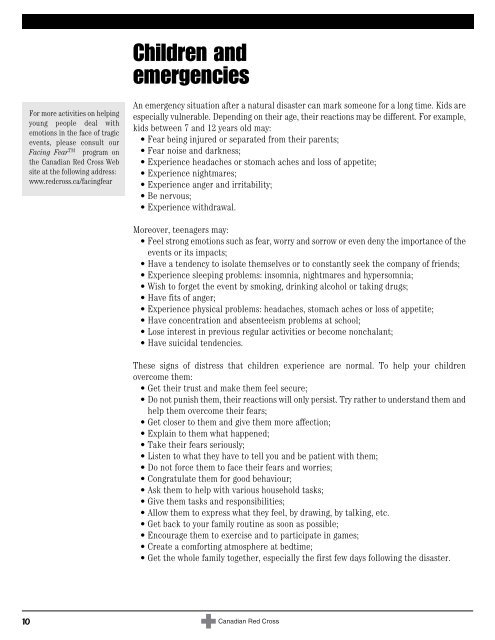3-1-2-1-Expect-the-Unexpected
3-1-2-1-Expect-the-Unexpected
3-1-2-1-Expect-the-Unexpected
- No tags were found...
Create successful ePaper yourself
Turn your PDF publications into a flip-book with our unique Google optimized e-Paper software.
Children andemergenciesFor more activities on helpingyoung people deal wi<strong>the</strong>motions in <strong>the</strong> face of tragicevents, please consult ourFacing Fear TM program on<strong>the</strong> Canadian Red Cross Website at <strong>the</strong> following address:www.redcross.ca/facingfearAn emergency situation after a natural disaster can mark someone for a long time. Kids areespecially vulnerable. Depending on <strong>the</strong>ir age, <strong>the</strong>ir reactions may be different. For example,kids between 7 and 12 years old may:• Fear being injured or separated from <strong>the</strong>ir parents;• Fear noise and darkness;• Experience headaches or stomach aches and loss of appetite;• Experience nightmares;• Experience anger and irritability;• Be nervous;• Experience withdrawal.Moreover, teenagers may:• Feel strong emotions such as fear, worry and sorrow or even deny <strong>the</strong> importance of <strong>the</strong>events or its impacts;• Have a tendency to isolate <strong>the</strong>mselves or to constantly seek <strong>the</strong> company of friends;• Experience sleeping problems: insomnia, nightmares and hypersomnia;• Wish to forget <strong>the</strong> event by smoking, drinking alcohol or taking drugs;• Have fits of anger;• Experience physical problems: headaches, stomach aches or loss of appetite;• Have concentration and absenteeism problems at school;• Lose interest in previous regular activities or become nonchalant;• Have suicidal tendencies.These signs of distress that children experience are normal. To help your childrenovercome <strong>the</strong>m:• Get <strong>the</strong>ir trust and make <strong>the</strong>m feel secure;• Do not punish <strong>the</strong>m, <strong>the</strong>ir reactions will only persist. Try ra<strong>the</strong>r to understand <strong>the</strong>m andhelp <strong>the</strong>m overcome <strong>the</strong>ir fears;• Get closer to <strong>the</strong>m and give <strong>the</strong>m more affection;• Explain to <strong>the</strong>m what happened;• Take <strong>the</strong>ir fears seriously;• Listen to what <strong>the</strong>y have to tell you and be patient with <strong>the</strong>m;• Do not force <strong>the</strong>m to face <strong>the</strong>ir fears and worries;• Congratulate <strong>the</strong>m for good behaviour;• Ask <strong>the</strong>m to help with various household tasks;• Give <strong>the</strong>m tasks and responsibilities;• Allow <strong>the</strong>m to express what <strong>the</strong>y feel, by drawing, by talking, etc.• Get back to your family routine as soon as possible;• Encourage <strong>the</strong>m to exercise and to participate in games;• Create a comforting atmosphere at bedtime;• Get <strong>the</strong> whole family toge<strong>the</strong>r, especially <strong>the</strong> first few days following <strong>the</strong> disaster.10



